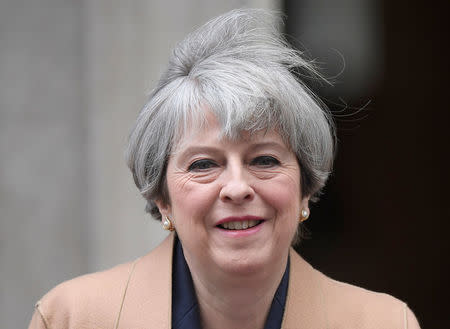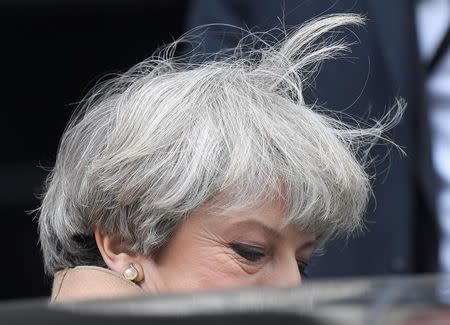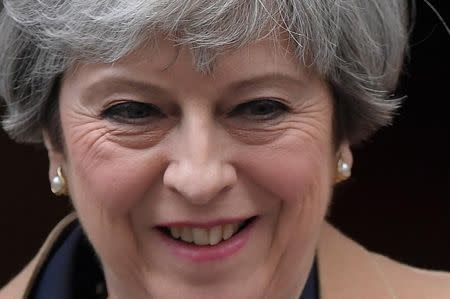May's Conservatives take 23 point poll lead, matching Thatcher landslide - Ipsos MORI
By Guy Faulconbridge LONDON (Reuters) - British Prime Minister Theresa May's Conservatives have almost twice as much voter support as the opposition Labour Party ahead of a June 8 election, a lead equal to that commanded by Margaret Thatcher before her 1983 landslide victory, Ipsos MORI said. Since May surprised rivals and financial markets by calling a snap election, opinion polls have shown May has far greater support than Labour leader Jeremy Corbyn and that she is likely to win a big majority in the 650-seat lower house of parliament. An Ipsos MORI telephone poll of 1,004 adults conducted on April 21-25 put the Conservative lead at 23 percentage points, while a Panelbase online poll of 1,026 people on April 20-24 put their lead on 22 percentage points. "The Conservatives are starting the campaign matching the biggest lead we have ever recorded for them during an election campaign - which was back in 1983 ahead of Thatcher's victory," Gideon Skinner, head of political research at Ipsos MORI, told Reuters. Thatcher, riding a wave of popularity after the Falklands War against Argentina, won a 144-seat majority in that election against Labour's Michael Foot, whose left-wing socialist manifesto was branded by a party colleague as "the longest suicide note in history". May's predecessor, David Cameron, won a majority of 12 seats in a 2015 election, the first overall Conservative victory since Thatcher's successor, John Major, won in 1992. MAY'S GAMBLE After winning Britain's top job in the political turmoil which followed the June 23 Brexit vote, May repeatedly ruled out a snap election until last Tuesday, when she announced outside her 10 Downing Street residence she would seek a new mandate. May is betting that the weakness of Labour leader Corbyn and the unexpected resilience of the British economy since the Brexit vote will bolster her majority in parliament ahead of potentially disruptive EU divorce talks. "These numbers suggest that the immediate public reaction has been just what she was probably hoping for: there are no signs of a negative reaction to her calling the election, while leadership and competence are going to be important factors in this election," said Skinner from Ipsos MORI. The Ipsos MORI poll put May's party up 6 percentage points from March on 49 percent, Labour down 4 percentage points on 26, the Liberal Democrats unchanged on 13 percent and the United Kingdom Independence Party down 2 percentage points on 4 percent. The poll showed 61 percent of voters thought May would be the most capable prime minister, well ahead of the 23 percent who said Corbyn would be. Ipsos MORI also found that 63 percent of those expressing a voting intention had already made up their mind, with 78 percent of Conservative voters and 56 percent of Labour supporters saying they had made their decision. The Panelbase poll put May's party on 49 percent, up 10 percentage points since it last polled in January, Labour down 4 points to 27 percent and UKIP down 9 points to 5 percent. Amid concerns about voter fatigue with politics after a 2014 independence referendum in Scotland, the 2015 general election and the 2016 Brexit vote, May has cautioned against complacency, saying she is not taking anything for granted. Skinner declined to predict whether May would win a majority to rival Thatcher's more than three decades ago. "I won't be making any projections on seats or majorities partly because it is a snap election, so it wouldn't be surprising to see some fluctuation in public opinion in the campaign," he said. "But clearly it is looking very positive for the Conservatives." (Writing by Guy Faulconbridge; Editing by Gareth Jones)




